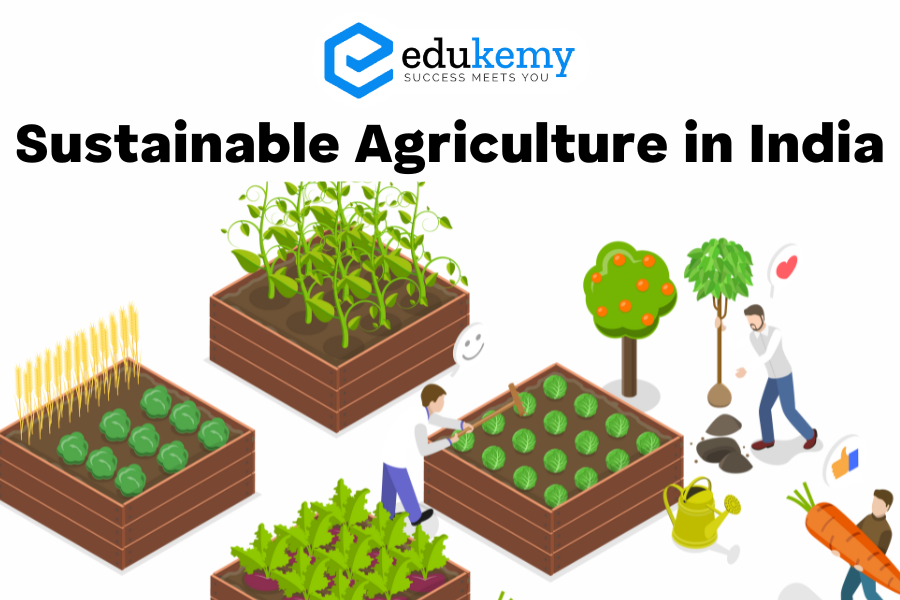
Sustainable agriculture in India has emerged as a crucial paradigm in the country’s quest for food security, environmental conservation, and socio-economic development. With a rapidly growing population and shrinking natural resources, the need to transition towards sustainable agricultural practices has become more urgent than ever. Sustainable agriculture encompasses a range of methods and techniques aimed at maximizing crop yields while minimizing the negative impacts on the environment, such as soil degradation, water depletion, and loss of biodiversity. In India, where agriculture is the backbone of the economy and a significant source of livelihood for millions, the adoption of sustainable practices holds the promise of ensuring long-term food security, improving farmer incomes, and mitigating the adverse effects of climate change. This paradigm shift towards sustainability not only benefits the present generation but also ensures the well-being of future generations by preserving the integrity of the ecosystem and fostering resilience in the face of emerging challenges.
Contents
- 1 Sustainable Agriculture in India:
- 2 FAQs
- 2.1 Q: What is sustainable agriculture in India?
- 2.2 Q: What are some key challenges faced by sustainable agriculture in India?
- 2.3 Q: How is the government supporting sustainable agriculture initiatives in India?
- 2.4 Q: What are some successful examples of sustainable agriculture practices in India?
- 2.5 Q: How can consumers contribute to promoting sustainable agriculture in India?
- 3 In case you still have your doubts, contact us on 9811333901.
Sustainable Agriculture in India:
- Introduction:
- Agriculture often exerts unsustainable pressure on natural resources, leading to issues like land pollution, water depletion, and erosion of crop diversity.
- Sustainable agriculture in India is often termed as the “Evergreen Revolution,” aiming to meet current needs without compromising future requirements.
- Key Practices for Sustainable Agriculture:
- Organic Farming:
- Focuses on avoiding synthetic inputs like fertilizers and pesticides.
- Promotes soil health and biodiversity.
- Zero Budget Natural Farming (ZBNF):
- Emphasizes minimal external input, relying on natural processes.
- Aims for self-sufficiency without relying on external inputs.
- Micro Irrigation:
- Efficient water management through techniques like drip and sprinkler irrigation.
- Reduces water wastage and improves crop yield.
- Water Users Association:
- Encourages best practices in the use of irrigation water.
- Promotes collective and sustainable water management.
- Genetically Modified Organisms (GMOs):
- Calibrated permission for GMOs while considering potential threats to natural varieties.
- Balancing technological advancements with environmental concerns.
- Biofertilizers and Biopesticides:
- Use of natural fertilizers and pesticides derived from organic sources.
- Reduces reliance on synthetic chemicals and minimizes environmental impact.
- Community Managed Sustainable Agriculture (CMSA):
- Alternative to conventional, input-intensive agriculture models.
- Promotes the use of locally available organic inputs, traditional farming methods, and community involvement.
- Implemented in Andhra Pradesh with around 1.2 million farmers across 9000 villages covering 1.2 million hectares.
- Centers around Self-Help Groups (SHGs) and community-based sustainable practices.
- Organic Farming:
- Benefits and Goals:
- Sustainable agriculture practices aim to mitigate environmental impact, preserve natural resources, and ensure long-term food security.
- The focus is on creating a balance between meeting current agricultural needs and safeguarding the environment for future generations.
Sustainable agriculture practices in India encompass diverse approaches, reflecting a commitment to environmental stewardship, community involvement, and the long-term viability of agricultural systems.
FAQs
Q: What is sustainable agriculture in India?
Sustainable agriculture in India refers to a farming approach that aims to meet the current needs of food production without compromising the ability of future generations to meet their own needs. It involves practices that promote soil health, water conservation, biodiversity preservation, and the minimization of negative environmental impacts.
Q: What are some key challenges faced by sustainable agriculture in India?
Some key challenges faced by sustainable agriculture in India include water scarcity, soil degradation, loss of biodiversity, climate change impacts, limited access to resources and technology for small-scale farmers, and the need for policy support and incentives to encourage sustainable practices.
Q: How is the government supporting sustainable agriculture initiatives in India?
The Indian government supports sustainable agriculture initiatives through various schemes and programs such as the National Mission for Sustainable Agriculture (NMSA), Paramparagat Krishi Vikas Yojana (PKVY), Rashtriya Krishi Vikas Yojana (RKVY), and Pradhan Mantri Krishi Sinchayee Yojana (PMKSY). These initiatives aim to promote organic farming, conservation agriculture, agroforestry, and efficient water management practices among farmers.
Q: What are some successful examples of sustainable agriculture practices in India?
Some successful examples of sustainable agriculture practices in India include zero tillage farming, crop rotation, organic farming, integrated pest management (IPM), use of biofertilizers and biopesticides, agroforestry systems, and rainwater harvesting techniques. These practices not only improve soil health and crop productivity but also contribute to environmental conservation.
Q: How can consumers contribute to promoting sustainable agriculture in India?
Consumers can contribute to promoting sustainable agriculture in India by supporting organic and locally sourced food products, reducing food waste, choosing products certified by recognized sustainability standards, advocating for policies that support sustainable farming practices, and engaging in community-supported agriculture initiatives. By making informed choices and demanding sustainable products, consumers can play a significant role in driving positive change in the agricultural sector.
In case you still have your doubts, contact us on 9811333901.
For UPSC Prelims Resources, Click here
For Daily Updates and Study Material:
Join our Telegram Channel – Edukemy for IAS
- 1. Learn through Videos – here
- 2. Be Exam Ready by Practicing Daily MCQs – here
- 3. Daily Newsletter – Get all your Current Affairs Covered – here
- 4. Mains Answer Writing Practice – here

